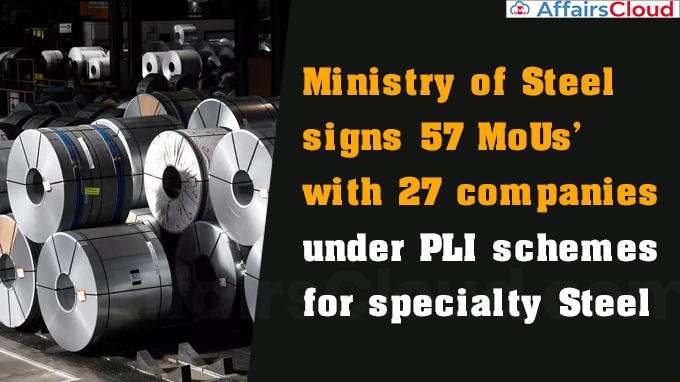 On March 17, 2023, the Ministry of Steel signed 57 Memorandums of Understanding (MoUs) with 27 companies covering 20 sub-categories for specialty steel under the Rs. 6322 crores Production Linked Incentive (PLI) Scheme at an event held at Vigyan Bhawan in New Delhi, Delhi.
On March 17, 2023, the Ministry of Steel signed 57 Memorandums of Understanding (MoUs) with 27 companies covering 20 sub-categories for specialty steel under the Rs. 6322 crores Production Linked Incentive (PLI) Scheme at an event held at Vigyan Bhawan in New Delhi, Delhi.
- The MoUs were presented to the company representatives by Union Minister Jyotiraditya Scindia, Ministry of Steel & Ministry of Civil Aviation, and Minister of State (MoS) Faggan Singh Kulaste, Ministry of Steel.
During the event, the Pellet Manufacturers Association of India (PMAI) released a booklet highlighting pellets as a value-added product, the manufacturing process, and the future of the industry in India.
Significance
i.The PLI scheme includes all of India’s leading steelmakers, notably Tata Steel, JSW Steel, the Steel Authority of India, ArcelorMittal Nippon Steel India, and Jindal Steel & Power, either directly or through subsidiaries.
- MOUs for 8 product categories have been signed by Tata Steel Ltd, Tata Steel Long Products Limited, and The Tinplate Company of India Limited.
ii.The scheme has also qualified a number of smaller secondary steelmakers.
PLI Scheme for Specialty Steel
i.The Union Cabinet approved the PLI Scheme for specialty steel in July 2021, with a 5-year financial investment of Rs. 6322 crore.
- Objective: To boost domestic manufacturing by attracting capital investment, generating employment, and fostering technological advancement in the steel sector.
ii.The PLI scheme is projected to generate an investment of around Rs. 30,000 crores and the addition of about 25 million tonnes of specialty steel capacity over the next 5 years.
- This will also contribute to the country’s ambition of becoming the third largest economy by 2030-31.
Steel Industry in India
i.A Rs. 10 lakh crore capital expenditure proposal was announced in the budget for 2023-24, which will be a major source of demand for the steel industry.
ii.India has emerged as the powerhouse of evolution and growth in the steel sector as a result of a structural shift globally from the West to the East.
iii.India is on track to become a manufacturing hub, increasing the share of steel in the Gross Domestic Product (GDP) from 2% to 5%.
iv.India is also on course to manufacture 125 million tonnes and increase consumption by 11% to 12%.
v.According to the Ministry of Steel, the iron and steel industry accounts for around 8% of total carbon dioxide (CO2) emissions annually, while India contributes 12% of overall CO2 emissions.
Specialty Steels
i.Specialty steels are value-added steel grades manufactured by processing finished steel.
ii.Alloy steel, coated and plated steels, electrical steel, high strength steel, and wear-resistant steel are a few types of specialty steel.
- India imports electrical steel from countries such as Japan and South Korea for application in electric motors, transformers, and power distribution systems.
iii.Despite being the world’s second-largest steel manufacturer, India still imports specialty steel.
Recent Related News:
In February 2023, Tata Steel Limited successfully completed the 1st multi-modal shipment of 960 tonnes of steel TMT (Thermo Mechanically Treated) bars from Haldia Port in West Bengal to Agartala in Tripura through the Indo-Bangladesh Protocol (IBP) route, reiterating its commitment to a sustainable future.
About Tata Steel Limited:
It was established in India as Asia’s first integrated private steel company in 1907. CEO & MD – T V Narendran
Headquarters – Mumbai, Maharashtra




